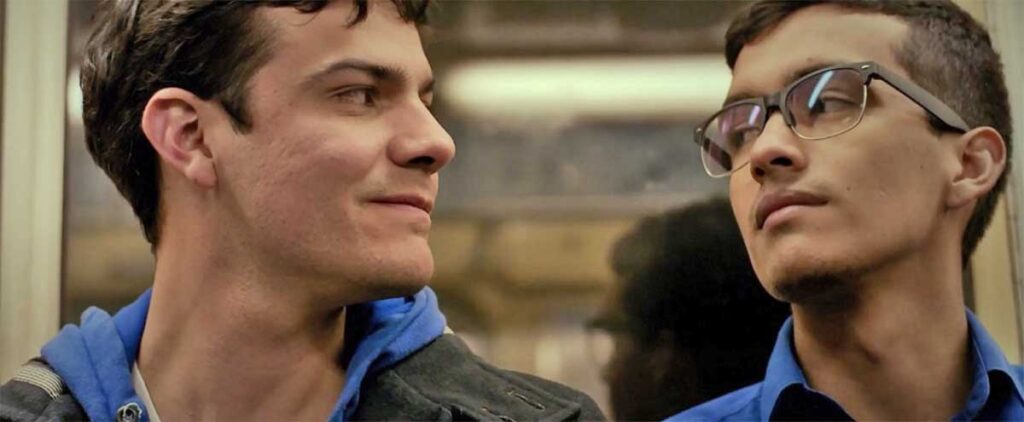Brothers David and Francisco Salazar’s engrossing film, “Nowhere,” now available on DVD and VOD, artfully considers the sacrifices a couple will — or will not — make for one another.
Adrian (Miguel González) and Sebastian (Juan Pablo Castiblanco) are very affectionate in bed, making breakfast, or even playing soccer with their friends. They live in New York and often kiss in public. However, Adrian is not out to his parents, who live back in Colombia. Sebastian is encouraging Adrian to come out, even though he himself is estranged from his own father.
The couple’s relationship is tested when Sebastian loses his journalism job because he does not have (and cannot get) an H-1B visa. Because of Adrian’s immigration status — he is waiting for his own H-1B papers and is not a U.S. citizen or in possession of a green card — same sex marriage is not an option to keep Sebastian in the country.
“Nowhere” shrewdly depicts how this gay couple navigates things in an effort to stay together. They approach a marriage broker, who requires a non-negotiable $20,000 for her services. They ask their friend Stephanie (Nathalie Rangel) to wed Sebastian, but she declines. Adrian helps Sebastian get a job that might keep him in the States, even though that would be a temporary solution at best. Going back to Colombia may, in fact, be the couple’s best option, but Adrian does not want to do that; he feels it is too risky to return.
Thankfully, the filmmakers resist playing out the sham marriage storyline, concentrating instead on how this situation impacts both men in the relationship. The Salazars often keep their camera tight on the couple’s faces expressing the urgency of their dilemma and the anxiety it is causing them both. The physical space between the men grows wider as the story develops and their relationship starts to splinter.
“Nowhere” depicts Adrian hoping for a quick fix and getting repeatedly rebuffed. His determination and his frustration become ugly, and his character’s selfishness makes him increasingly more unlikable. (It is telling when Adrian tries to shame a friend into marrying Sebastian that she responds by throwing her drink in his face.) He is also strong-minded in his office, where his ideas cause him to lock horns with his boss. His controlling nature gets passive-aggressive in his relationship, as when he leaves Sebastian a note that reads, “We belong here together. This is our home.” Adrian is even subtly abusive towards Sebastian as their relationship suffers.
González is fascinating to watch as Adrian spirals downward. The actor makes his character initially charming, but he reveals his true nature the minute he doesn’t get what he wants. However, Adrian does have moments of vulnerability. When he calls home on occasion, he cannot bring himself to come out to his parents, illustrating one of his deep insecurities. Adrian may behave badly, but he feels he must take on the responsibility of solving the immigration issue, albeit on his own terms, and carries that self-imposed weight on his shoulders. González makes that burden tangible, which is why Adrian can be sympathetic, even if he is a jerk.
In contrast, Sebastian has a better sense of self, despite his tenuous situation. And Castiblanco gives a very natural performance as a bright young man in a tough situation. A pivotal discussion Sebastian has with Stephanie helps him realize how to process his feelings and act on his instincts, and Castiblanco is compelling as Sebastian asserts his backbone.

The Salazars also give Adrian a scene with Stephanie that reinforces the couple’s uneven power dynamic. The film does not reveal how long the guys have been together — there is a suggestion they met in a class back in Colombia — but it is clear that Sebastian moved to New York on Adrian’s request. Now that they are forced to confront the consequences of this action, they find themselves at a possible impasse.
And this is what makes “Nowhere” so involving. Should Sebastian or Adrian sacrifice what they want to stay together? Does every relationship have to have a leader and a follower, or should there be balance or a compromise? Will their relationship survive? And are viewers hoping the couple will work things out, or is it best for each guy to follow his own heart at this particular junction in their lives? That the film keeps viewers invested in the answer is why “Nowhere” is so rewarding.
A hopeful sequence late in the film has the lovers hiking around Lake George and recalling their life together. It shows how good they can be before a situation arises that forces their hand. What ultimately transpires is arguably the best outcome and why “Nowhere” is so potent. This superb drama never pulls punches.
